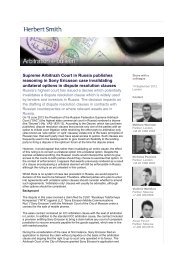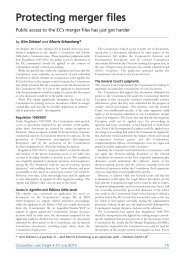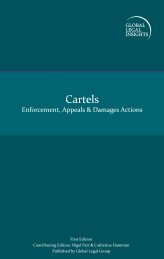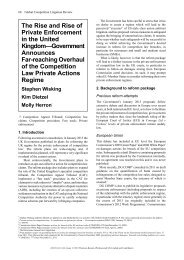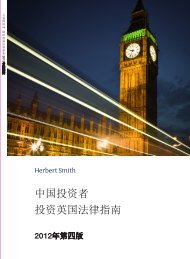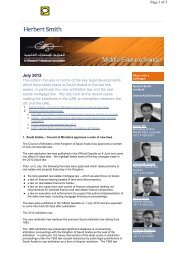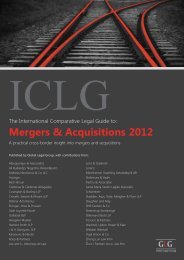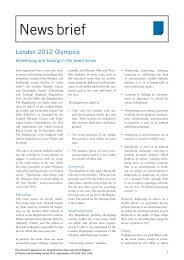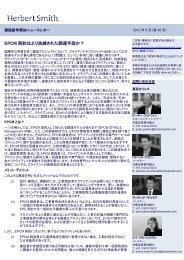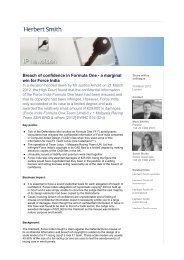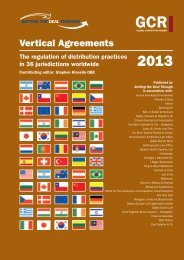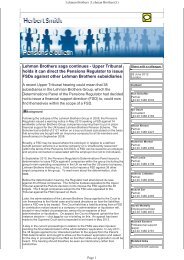Freedom of information: A guide for business - Herbert Smith Freehills
Freedom of information: A guide for business - Herbert Smith Freehills
Freedom of information: A guide for business - Herbert Smith Freehills
You also want an ePaper? Increase the reach of your titles
YUMPU automatically turns print PDFs into web optimized ePapers that Google loves.
BBC & One Transport Ltd v In<strong>for</strong>mation<br />
Commissioner – EA/2010/0150<br />
The Tribunal upheld an appeal by the BBC against the<br />
In<strong>for</strong>mation Commissioner’s decision requiring it to disclose<br />
the sum paid by the BBC to a taxi company in a particular<br />
year. It was held that the BBC was entitled to withhold<br />
the <strong>in<strong>for</strong>mation</strong> under section 43(2) FOIA. The Tribunal<br />
was satisfied on the evidence that there was a real and<br />
significant risk that prejudice would occur to the BBC<br />
and/or the taxi company by disclosure - the taxi company<br />
had shown that a competitor, armed with the disputed<br />
<strong>in<strong>for</strong>mation</strong>, could work with other <strong>in<strong>for</strong>mation</strong> already in<br />
the public domain to unravel its pricing mechanism and<br />
detailed <strong>in<strong>for</strong>mation</strong> about its bidding process. It was not<br />
in the public interest to disclose the <strong>in<strong>for</strong>mation</strong> as the<br />
evidence showed that disclosure would amongst other<br />
things prevent the BBC from ensuring future tenders were<br />
conducted in a fair, open environment. In reaching its<br />
decision the Tribunal took account <strong>of</strong> the OGC guidance on<br />
disclosure <strong>of</strong> civil procurement <strong>in<strong>for</strong>mation</strong>.<br />
Zacharides v In<strong>for</strong>mation<br />
Commissioner – EA/2010/0162<br />
A request was made <strong>for</strong> progress reviews submitted by<br />
UK Athletics to the UK Sports Council pursuant to a funding<br />
agreement over a particular period. The <strong>in<strong>for</strong>mation</strong> was<br />
withheld under section 41 FOIA (confidential <strong>in<strong>for</strong>mation</strong>)<br />
and the In<strong>for</strong>mation Commissioner upheld that decision. On<br />
appeal to the Tribunal, it was accepted that the <strong>in<strong>for</strong>mation</strong><br />
had the necessary quality <strong>of</strong> confidence - the Sports<br />
Council had undertaken not to disclose it and there was<br />
now a contract in place containing a confidentiality clause.<br />
The Tribunal then considered whether there could be any<br />
public interest defence to a claim <strong>for</strong> breach <strong>of</strong> confidence<br />
which was sufficient to outweigh the presumption <strong>of</strong><br />
confidentiality. It concluded that there was not and that the<br />
<strong>in<strong>for</strong>mation</strong> should not be disclosed.<br />
Elmbridge Borough Council v In<strong>for</strong>mation<br />
Commissioner – EA/2010/0106<br />
The Tribunal upheld the Commissioner’s decision requiring<br />
the Council to disclose a viability report submitted by a<br />
developer in support <strong>of</strong> a planning application. The report<br />
contained details on costs, revenues, values and finances<br />
associated with the development. The Council had withheld<br />
the <strong>in<strong>for</strong>mation</strong>, relying on the exemptions in Regs. 12(5) (e)<br />
and (f) <strong>of</strong> the EIR and claiming that the <strong>in<strong>for</strong>mation</strong> was<br />
commercially sensitive and would be prejudicial to<br />
the developer if disclosed. The Tribunal found, as the<br />
Commissioner had, that the exemptions were not engaged<br />
because the Council had not provided independent and<br />
objective evidence <strong>of</strong> the alleged prejudice. The Tribunal<br />
found that the “evidence” in support <strong>of</strong> the exemptions was<br />
no more than assertions and speculation by the developer<br />
and other interested parties. They had failed to establish<br />
that on the balance <strong>of</strong> probabilities disclosure <strong>of</strong> the<br />
<strong>in<strong>for</strong>mation</strong> would harm the developer’s economic interests.<br />
Staf<strong>for</strong>dshire County Council v In<strong>for</strong>mation<br />
Commissioner – EA/2010/0015<br />
The requester, who lived near a quarry, asked <strong>for</strong> copies <strong>of</strong><br />
the annual mineral returns submitted <strong>for</strong> the last 10 years<br />
in respect <strong>of</strong> that quarry, including details <strong>of</strong> the sales and<br />
reserves <strong>for</strong> each year. The <strong>in<strong>for</strong>mation</strong> was collected<br />
annually by the completion <strong>of</strong> a <strong>for</strong>m by each quarry<br />
operator on a voluntary basis. The <strong>for</strong>ms were marked<br />
“strictly confidential” and were sent with a letter promising<br />
to treat any data provided with the strictest confidence. The<br />
In<strong>for</strong>mation Commissioner had held that Regs. 12 (5) (e)<br />
and (f) <strong>of</strong> the EIRs were engaged but required disclosure<br />
in the public interest. On appeal, the Tribunal found that if<br />
the <strong>in<strong>for</strong>mation</strong> was disclosed, this might lead to quarry<br />
operators refusing to submit the <strong>in<strong>for</strong>mation</strong>, which would<br />
not be in the public interest. There was a real risk that<br />
the quarry operator could bring a successful breach <strong>of</strong><br />
confidence claim against the local authority.<br />
Bath & North East Somerset Council v In<strong>for</strong>mation<br />
Commissioner – EA/2010/0045<br />
The Tribunal allowed in part the Council’s appeal against<br />
the Commissioner’s decision that it should disclose (i) a<br />
developer’s financial model and (ii) independent viability<br />
reports prepared <strong>for</strong> the Council, in the context <strong>of</strong> a<br />
co-operation agreement between the developer (Crest<br />
Nicholson) and the Council relating to a major development<br />
on a brownfield site in the centre <strong>of</strong> Bath. Under the<br />
terms <strong>of</strong> the agreement, Crest had agreed to work on an<br />
“open book” basis, so that the Council could look at the<br />
financial assumptions underlying the proposals. As part <strong>of</strong><br />
that process Crest provided the Council with its detailed<br />
financial models which included commercially sensitive<br />
<strong>in<strong>for</strong>mation</strong> relating to fees, cash flow and anticipated land<br />
values etc. It was common ground that this <strong>in<strong>for</strong>mation</strong> fell<br />
within the exemption but, overruling the Commissioner,<br />
the Tribunal held that the models could be withheld in the<br />
public interest. In relation to the viability assessments,<br />
these should be disclosed subject to the redaction <strong>of</strong><br />
commercially sensitive <strong>in<strong>for</strong>mation</strong>. In support <strong>of</strong> the public<br />
interest in non-disclosure, the Tribunal was persuaded<br />
that disclosure would have prejudiced Crest’s negotiating<br />
position and given its competitors a material advantage<br />
at a time when it was in active discussions regarding a<br />
comprehensive restructuring <strong>of</strong> its finances. There would<br />
also have been a prejudical commercial impact on the<br />
scheme as a whole and on the Council’s commercial<br />
interests, because any litigation ensuing if the <strong>in<strong>for</strong>mation</strong><br />
was disclosed would incur costs <strong>for</strong> the Council and bring<br />
uncertainty to the future <strong>of</strong> the scheme.<br />
The Higher Education Funding Council <strong>for</strong> England v<br />
In<strong>for</strong>mation Commissioner – EA/2009/0036<br />
The Tribunal held that section 41 FOIA did not apply to<br />
<strong>in<strong>for</strong>mation</strong> relating to the state <strong>of</strong> buildings at Higher<br />
Education Institutions which they had voluntarily<br />
contributed to a database <strong>of</strong> such <strong>in<strong>for</strong>mation</strong>. The HEFCE<br />
confirmed that the requested <strong>in<strong>for</strong>mation</strong> was held on<br />
the database but refused to disclose it on the basis that<br />
most <strong>of</strong> it had been received from third parties who had an<br />
expectation <strong>of</strong> confidentiality. The Tribunal considered first<br />
A freedom <strong>of</strong> <strong>in<strong>for</strong>mation</strong> <strong>guide</strong> <strong>for</strong> <strong>business</strong> 21



